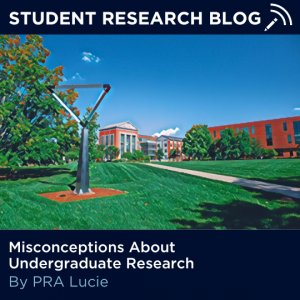By Lucie Lopez, Peer Research Ambassador
 “Why do I need research? I don’t need to write an Honors Thesis.”
“Why do I need research? I don’t need to write an Honors Thesis.”
“I can’t do research; I’m not a STEM major.”
“Why should I do research? I’m not going to medical school.”
Do any of these statements sound familiar? Have you said or thought these yourself? If you’re asking yourself these questions or if you’re skeptical about getting involved in research, read on.
Close your eyes and picture a “researcher.” The image that probably popped into your head was a person in a white lab coat sitting at a lab bench, working with a pipette and a microscope. That person is a researcher, but they represent only a fraction of what research looks like.
Before coming to UConn, I didn’t know what research could look like. I was stuck on the image of the person in the white lab coat. However, as I became more involved with research, I realized it didn’t have to look like that. As an undergraduate researcher working on an IDEA Grant project investigating the relationship between participation in free/reduced school meal programs and sense of belonging at school, I collect quantitative survey data and qualitative interview data. I spend a lot of time at my computer reading previously published research papers, creating surveys, and statistically analyzing data. The type of researcher I am is another tiny fraction of what it looks like to be engaged in research.
For an English major, research could involve reviewing literature archives and writing a literature review summarizing what they read and how it can contribute to a more extensive investigation. The SHARE Summer Apprenticeship program supports social sciences, humanities, and arts students. This program is geared towards first- and second-year students from underrepresented backgrounds with little to no research experience. In addition, research does not only involve analyzing data or literature. Research can also include creative and community service projects. The IDEA Grant program supports various creative projects, from documentaries to composing music to puppetry. Engaging in research will look different for everyone!
“All of these opportunities are great, but how will getting involved in research or a creative project benefit me? I don’t want to go to graduate school; I want to start working in industry right after college.”
By engaging in undergraduate research, you can gain many transferable skills that employers value. For example, collaborating with a team. There are many different people on one research project: a principal investigator (PI) (there might even be multiple PIs), graduate students, and undergraduate students. For research to succeed, communication and collaboration are essential. Many labs host weekly or biweekly meetings, and when you work closely with a PI, you might even meet with them weekly–in addition, developing a close relationship with a PI might come in handy when you need a letter of recommendation. Working in a team is an essential skill for any profession that employers value.
Research also teaches you how to think critically and adapt. The research your PI is engaged in may inspire you to think critically about other issues or questions related to that field. That, in turn, might inspire you to take on an independent project so that you can contribute to answering some of those questions. In addition, the research process often involves some bumps in the road. Timelines may get thrown off by certain aspects taking more or less time than was expected, getting survey responses from bots you have to sift through, or not getting as many interview participants as you had hoped. There is always an endless possibility of things that could not go to plan in research (or in any profession), but being able to adapt and be resilient when changes arise is most important. Anything you become involved in in the future will require resilience (it’s also a good skill for life in general), and research can help develop that.
Regardless of what you want to do after your time as an undergraduate at UConn, research should be something you consider, no matter your major, year, or future plans. Research can give you skills that you can utilize in any field. In addition, UConn has opportunities for all students to get involved in research and creative or community service projects. UConn has something to offer whether you’re interested in Linguistics, Chemical Engineering, or Music. Be open to exploring research outside of your major (you are not tied to your academic major when it comes to research!) because you never know where it might take you. Follow your passions, embrace the unknown, and be curious!
Lucie is a senior double majoring in Psychological Sciences and Spanish. Click here to learn more about Lucie.